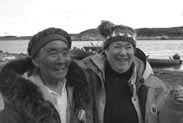Talk of the tundra
Legal workshop addresses northern concerns: prisons, abuse and FM radio

Justice Claire L'Heureux-Dubé meets elder from the Inuit community Puvirnituq.
MYLÈNE JACCOUD, UNIVERSITÉ DE MONTRÉAL
It was hardly your usual legal workshop. On three chilly summer afternoons, participants met in a large tent miles from a remote village in the north of Quebec to address issues of justice, while slabs of raw caribou lay on cardboard outside.
The meeting brought together 27 women from the south of the province and from each of the 14 scattered Inuit villages that comprise the region of Quebec known as Nunavik.
The three-day gathering was held a half-hour away from the Inuit village of Puvirnituq. Participants arrived at the site by motorized canoe. They were there to discuss social issues and justice, and to find solutions appropriate to a region and culture where southern legal practices can be both unfamiliar and impractical. Reports of the discussions were sent back daily by Hélène Buzzetti, a journalist from Le Devoir who was part of the delegation from the south.
Marie-Claude Prémont, a professor from McGill's Faculty of Law, helped organize the trip. "One of the striking things is that people there are truly interested in politics. There is a lot of talk about problems and finding solutions, but there are also times of feeling powerless," she says. "What we tried to achieve was a sense of empowerment."
Finding a way forward is a daunting task for Inuit women who are frequently the victims of the violence that often lashes their communities. Applying conventional Canadian law is difficult given that government prosecutors are available only sporadically, usually only for a period of days. The situation is further complicated by the lack of prisons in Nunavik, meaning that juries are reluctant to issue guilty verdicts that will send members of their community to incarceration facilities thousands of miles to the south.
Language, sexual abuse and suicide were also discussed at the gathering. Even seemingly pedestrian issues like the use of FM radio can take on a particular significance in far northern communities. Buzzetti reported that Inuit in several villages were working on ways to prevent their lone radio stations from being used by individuals to propagate feuds and malicious gossip.
The meeting took place in three languages: Inuktitut, English and French. As McGill's Prémont describes, overlapping waves of colonization have led to a fracturing of language in the North.
"There are actually four levels of history in Inuit culture," she says. Many elders speak only Inuktitut, as is the case with the youngest generation. Those born in the 1940s and 1950s, however, were subjected to the enforced English-only policy of the federal government. Finally, the Inuit born in the 1960s and onward may choose French or English as the language of instruction after the first three years of schooling in Inuktitut.
Language forms only a part of colonialism's tangled legacy in the North. Prémont also points to the shooting of huskies by the federal government in the 1950s as a primary cause of the challenges faced by today's Inuit communities. Inuit women at the recent gathering repeated complaints by their people that a federal decision to slaughter their dogs eliminated traditional nomadic hunting practices and fractured their way of life.
One of the outcomes of the Puvirnituq gathering was the resurrection of the Nunavik Women's Association, which will provide a source of community and outreach for Inuit women.
The meeting was the second of three women's gatherings that are being financed by the Fund Claire L'Heureux-Dubé for Social Justice, which was created at the Faculty of Law of the University of Ottawa, in honour of the former Supreme Court Justice. Justice L'Heureux-Dubé was so enthusiastic about the project that she decided to participate in the camp.
The McGill Faculty of Law contributed to the Puvirnituq meeting. The project was made possible thanks to the support of Air Inuit.

